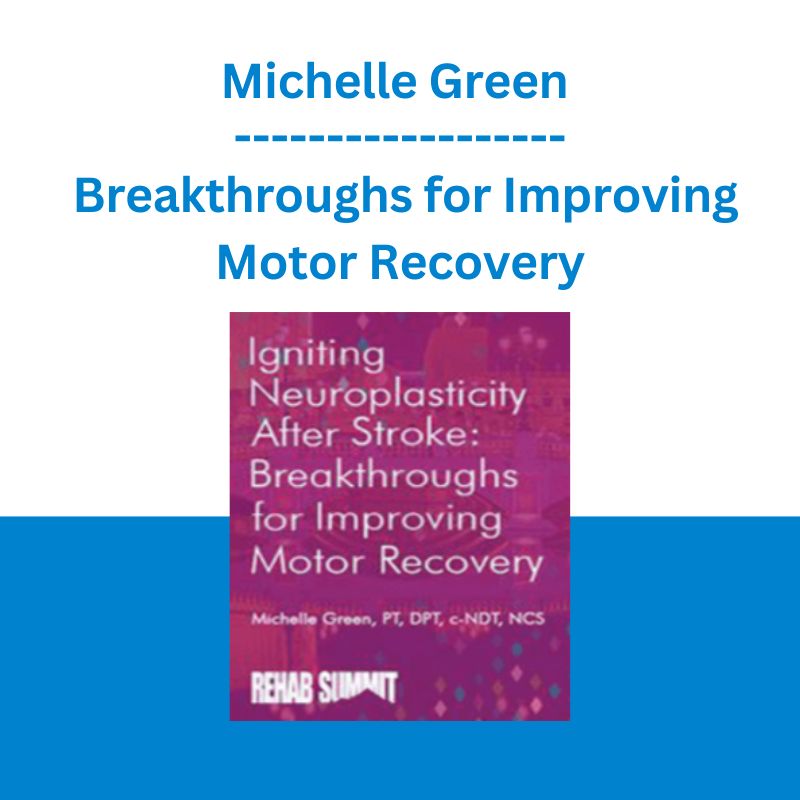*** Proof of Product ***
Exploring the Essential Features of “Michelle Green – Igniting Neuroplasticity after Stroke: Breakthroughs for Improving Motor Recovery”
Learn how to ignite recovery in stroke patients with innovative interventions that re-educate the movement patterns needed for compensation and recovery. Find out what is important for neuroplasticity to occur, and discover how to unlock the potential in cognitively impaired patients who cannot communicate or do not understand the goals of treatment. Take home key motor control strategies and targeted treatments for progressing patients from any level toward functional recovery and community reintegration.
Speaker
Michelle Green, PT, DPT, C-NDT, NCS
Michelle Green, PT, DPT, C-NDT, NCS, is an expert in stroke rehabilitation, with over 20 years of experience helping countless patients recover from neurological conditions. Her background in NDT, Pilates, and yoga has influenced her assessment and treatment approach, providing her with enhanced insight into movement assessment and guided movement re-education.
Dr. Green travels nationally to present seminars on stroke rehabilitation, and she is known for her dynamic, hands-on teaching style. She earned her Doctorate in Physical Therapy from University of North Carolina Chapel Hill, and she teaches as an assistant professor in the DPT program at Campbell University. Her additional interests include education and learning, impairment-based treatment across the lifespan, and application of mind-body practices for improving mental and physical health.
Speaker Disclosures:
Financial: Michelle Green has an employment relationship with Campbell University. She serves on the Curricular Advisory Council Team in the Physical Therapy Department at Ithaca College. Michelle Green also serves as a manuscript reviewer for the Journal of Exercise Science, LSVT Global Student Grant for Treatment Efficacy Studies with Neurologically Impaired Patients, and Journal of Geriatric Physical Therapy. She receives a speaking honorarium and recording royalties from PESI, Inc. She has no relevant financial relationships with ineligible organizations.
Non-financial: Michelle Green is a member of the American Physical Therapy Association. She is the co-chair for the APTA Academy of Neurologic PT On-Line Education Committee and serves on multiple educational committees, for a complete list contact PESI, Inc.
Objectives
- Analyze the latest research on neuroplasticity and its implications for stroke rehabilitation
- Apply steps for improving task assessment, intervention selection, progressions, and ultimately functional outcomes, using key concepts related to neuroplasticity, motor control, and motor learning
- Evaluate interventions related to compensation and recovery
Outline
Review the latest research on neuroplasticity and its implications for stroke rehabilitation
- Describe moto control and motor learning theories
- Introduce 5 Stages of Trask Performance
- Correlate deficits in task performance to identified impairments
- Develop framework for treatment progression based on 5 Stages of Task performance
Identify steps for improving task assessment, intervention selection, progressions, and ultimately functional outcomes, using key concepts related to neuroplasticity, motor control, and motor learning
- Define recovery and compensation
- Identify factors that guide our decisions to move toward interventions for recovery versus compensation
- Premorbid ability
- Stroke prognostic factors
- Stage in recovery
- Process where intervention is occurring
- Insurance/LOS limitations
- Provide evidence for recovery over compensation early in the rehab process
- Promote inclusion of compensation and recovery within treatment progression
Target Audience
- Physical Therapists
- Physical Therapist Assistants
- Occupational Therapists
- Occupational Therapy Assistants
- Athletic Trainers
- Massage Therapists
Please see the full list of alternative group-buy courses available here: https://lunacourse.com/shop/










 Jesse Livermore Trading System - Joe Marwood
Jesse Livermore Trading System - Joe Marwood  Chris Capre - Advanced Price Action Ongoing Training & Webinars
Chris Capre - Advanced Price Action Ongoing Training & Webinars  Greg Loehr - Advanced Option Trading With Broken Wing Butterflies
Greg Loehr - Advanced Option Trading With Broken Wing Butterflies  George Fontanills & Tom Gentile - Optionetics 6 DVD Series Home Study Course (Digital Download)
George Fontanills & Tom Gentile - Optionetics 6 DVD Series Home Study Course (Digital Download)  Travis Eliot - Yoga Foundations
Travis Eliot - Yoga Foundations  Jared Platt - Advanced Adobe Lightroom 5 Workflow
Jared Platt - Advanced Adobe Lightroom 5 Workflow  Forexmentor - Recurring Forex Patterns
Forexmentor - Recurring Forex Patterns  Matthew Kratter - Trader University
Matthew Kratter - Trader University  Ed Ponsi - Forex Trading
Ed Ponsi - Forex Trading